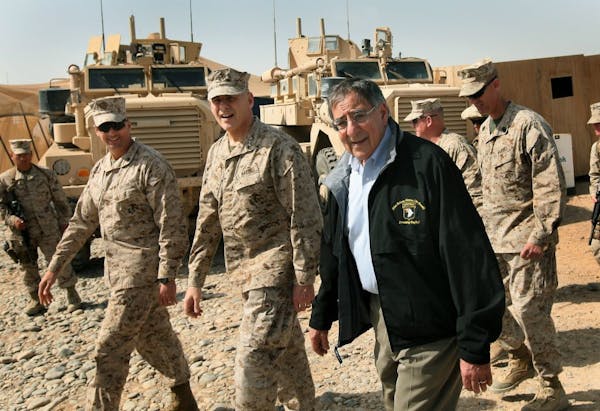KABUL, AFGHANISTAN - The Afghanistan endgame that President Obama outlined this week suffered new setbacks on Thursday as the Taliban suspended peace talks with the United States and President Hamid Karzai demanded that NATO withdraw forces from the rural outposts that are at the heart of its military mission there.
The developments are the latest in a cascade of challenges to the measured exit the administration and its coalition partners are planning, including a gradual turnover of security responsibility to Afghan troops, a paced U.S. and NATO withdrawal and a negotiated peace with the Taliban.
Administration officials had steeled themselves for fallout after last month's burning of Qur'ans by U.S. service members and Sunday's massacre of 16 civilians, apparently by an Army staff sergeant who went on a rampage. But Thursday's statements caught Western officials in Kabul off guard and sparked new concerns that the U.S.-led operation could unravel as trust erodes between Afghans and their foreign benefactors.
"Afghanistan is ready right now to take all security responsibilities completely," Karzai said in a statement issued shortly after he met with Defense Secretary Leon Panetta. "To speed up this process, authority should be given to Afghans."
The statement set no deadline for what it called the "withdrawal of international forces from villages." It reiterated Karzai's insistence that foreign troops should not be allowed to enter Afghan homes in the night raids on which U.S. commanders rely heavily to net suspected insurgents.
Karzai has a long history of making demands the international community ignores or implements slowly, and he has cried wolf many times. But if he presses ahead with the demand for withdrawal from the countryside, the U.S. military could face many of the same challenges it contended with in Iraq in 2009, as Baghdad sought to curb the movement and authority of American troops.
The effect in Afghanistan could be considerably more complex and dangerous. Although Iraq's insurgency had begun to wane, the Afghan militants remain strong. Coalition commanders see the constellation of small outposts in insurgent-plagued provinces as essential to their goal of providing enough security for the Afghan government to take root.
In a news conference in Washington with visiting British Prime Minister David Cameron on Wednesday, Obama acknowledged "multiple challenges along the way" but said that "in terms of pace, I don't anticipate at this stage that we're going to be making any sudden additional changes to the plan that we currently have."
"If we maintain a steady, responsible transition process, which is what we've designed, then I am confident that we can put Afghans in a position where they can deal with their own security," he said.
The plan NATO adopted in late 2010 has already undergone some changes. Although it had indicated that the turnover of security responsibility to the Afghans would not be completed until 2014, with NATO combat forces withdrawing by the end of that year, the alliance now hopes to transition to a supporting role throughout the country by the end of next year.
Karzai's statement said that the transition should be completed in 2013, and it was unclear whether he was proposing a different game plan from NATO's.
Obama also said that he expected a U.S.-Afghan strategic partnership agreement to be completed by the next NATO summit, in Chicago in May. But that agreement, designed to set the terms for a reduced but ongoing U.S. military presence in Afghanistan after 2014, has foundered over the issue of night raids.
Karzai has "just generally always been concerned that night raids are intrusive and heavy-handed, whereas what we've pointed out is that they're central to our ability to degrade Taliban operations and battlefield leadership," said a senior administration official in Washington, speaking on the condition of anonymity to discuss the sensitive negotiations. "We're trying to find the appropriate course of action."
Administration officials played down the significance of the Taliban statement suspending peace talks, describing it as part of a roller coaster they have grown familiar with ever since a series of U.S. meetings with the insurgents, most of them in the Persian Gulf emirate of Qatar, began in late 2010.
But the talks have been stalled for nearly two months, and the new announcement further diminished U.S. hopes that progress could be announced at the NATO meeting as planned.
